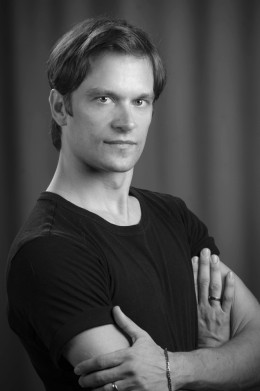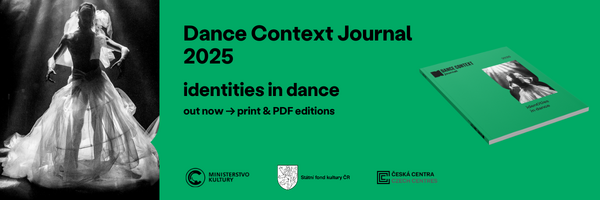Filip Barankiewicz To Become the New Head of the National Theatre Ballet
 On Saturday, December 20, 2014, director of the National Theatre doc. Jan Burian decided to appoint, on the basis of closed auditions, new artistic directors. Ballet will be led by Filip Barankiewicz, Daniel Špinar will be the new chief of Drama. "I am pleased that the position of artistic directors was sought after by distinctive personalities of Czech and world theater," says Jan Burian. "Within a few months, I have consulted with experts the names of potential candidates whom I addressed with the offer to apply. I have repeatedly met with each of them and provided the information necessary for the development of their concept. Candidates then presented their projects to the selection committees "describes the course of a six-month selection.
On Saturday, December 20, 2014, director of the National Theatre doc. Jan Burian decided to appoint, on the basis of closed auditions, new artistic directors. Ballet will be led by Filip Barankiewicz, Daniel Špinar will be the new chief of Drama. "I am pleased that the position of artistic directors was sought after by distinctive personalities of Czech and world theater," says Jan Burian. "Within a few months, I have consulted with experts the names of potential candidates whom I addressed with the offer to apply. I have repeatedly met with each of them and provided the information necessary for the development of their concept. Candidates then presented their projects to the selection committees "describes the course of a six-month selection.Other candidates for the chief of Ballet were: choreographer Jiří Bubeníček, first soloist of the Dresden Semperoper Ballet and former prima ballerina of the English National Ballet, Daria Klimentová, Royal Opera House teacher. In early December, the committee suggested to doc.Burian two of the three candidates. "We have issued recommendation that the director of the National Theatre undergoes a second round of talks on specific details of the cooperation with Jiří Bubeníček and Filip Barankiewicz," said after a meeting of the committee on Tuesday, December 2, 2014 doc. Jan Hančil, Chairman of the Board and Guarantee of the NT, rector of AMU. "We subsequently discussed the details of their projects with both gentlemen. Both are equal partners, personalities of European calibre. I‘d prefer to obtain both for collaboration, "says Jan Burian" I decided to give priority to Philip Barankiewicz. For me, among other things, he is a guarantee of continuous cooperation with Petr Zuska as a choreographer with the company. I am sure he will invite Jiří Bubeníček to collaborate as well, "he adds.
Ballet committee was in session on Tuesday ,December 2, 2014. It consists of members of the Guarantee Board of the National Theatre (Senator of the Parliament of the Czech Republic Jiří Šesták, director of the Brno City Theatre Stanislav Moša, director of The Dejvice theatre Eva Kejkrtová Měřičková, playwright Milan Uhde, rector of AMU Jan Hančil) and respected world experts: Ivan Liška (Director of Bayerisches Staatsballett Munich), Ted Brandsen (Director of the Dutch National ballet), Johannes Öhman (Director of the Royal Swedish ballet), Mário Radačovský (artistic director of the National Theatre in Brno) and Alexander Katsapov (first soloist of NT), who represented the ensemble.
The new artistic director of the National Theatre Ballet will take office in the 2017/2018 season, after 15 years of leadership of Petr Zuska: "I’ve known Filip for many years. I appreciate his professional and human aspects. He also knows the company quite well. He guested here for years as a brilliant performer, most recently as an excellent teacher. I am convinced that he will be a great chief..." Filip Barankiewicz was born in Warsaw, Poland. In 1986, he began his ballet training at the National Ballet School in his home city. During that time he performed in various ballets in Warsaw and Lódz. Emil Wesolowski created a role on him in The Way. In 1991 he won the Waslaw Nijinski Medal. In 1995, he graduated and won the first prize at the National Ballet Competition in Poland. He continued his studies with Marika Besabrasova at the Académie de Dance Classique in Monte Carlo where he received a scholarship sponsored by the Nurejev Foundation. There he received his diploma in 1996.
He joined the Stuttgart Ballet in that same year and was promoted to Demi-Soloist in September 2000, to Soloist in September 2001 and to Principal Dancer in September 2002.
His repertoire of major leading roles includes the title roles in Onegin and Romeo and Juliet, Prince Siegfried in Swan Lake and Petrucchio in The Taming of the Shrew (all: John Cranko), Albrecht in Giselle (Production: Reid Anderson, Valentina Savina) as well as Carabosse and Prince Desiré in The Sleeping Beauty (Márcia Haydée after Marius Petipa) and James in La Sylphide (Peter Schaufuss, after August Bournonville).
Other leading roles Filip Barankiewicz has danced with the Stuttgart Ballet are: Lenski in Onegin, Benvolio in Romeo and Juliet, Benno in Swan Lake and Hortensio in The Taming of the Shrew (all: John Cranko), the Peasant-Pas de deux in Giselle (Production: Reid Anderson, Valentina Savina), Colas in the Stuttgart Ballet’s premiere of Sir Frederick Ashton’s La Fille mal gardée, Gaveston and Warwick in Edward II (David Bintley), Basilio in Don Quijote (Maximiliano Guerra), The Blue Bird, the Prince of the East, and Ali Baba in Márcia Haydée’s The Sleeping Beauty (after Marius Petipa), des Grieux and Gaston in The Lady of the Camellias as well as Allan Gray in A Streetcar named Desire, both by John Neumeier.
Filip Barankiewicz also danced Sanguinic in The four Temperaments (George Balanchine), the First Movement in John Cranko’s Initials R.B.M.E., the Role in Green in Jerome Robbins’ Dances at a Gathering as well as leading parts in Serenade and Stravinsky Violin Concerto (both: George Balanchine), Orma (Mauro Bigonzetti), No More Play and Return to a strange Land (both: Jiří Kylián), Seventh Symphony (Uwe Scholz) and Le sacre du printemps by Glen Tetley.
He further performed in Stravinsky Violin Concerto and Symphony in C (both: George Balanchine), in John Cranko’s Jeu de Cartes, in Ashes (Daniela Kurz), The Song of the Earth (Sir Kenneth MacMillan), Vers un Pays Sage (Jean Christophe Maillot), Now and Then (John Neumeier), in Robert North’s Troy Game, in dreamdeepdown (Kevin O’Day), Seventh Symphony (Uwe Scholz), Arena, Le sacre du printemps, and Voluntaries (all: Glen Tetley), in 5 Tangos and Kleines Requiem (both: Hans van Manen) as well as the roles of the Doctor and the Paper Boy in A Streetcar named Desire (John Neumeier). At the Stuttgart Ballet’s Gala on New Years' Eve 1998 he performed the Pas de deux The Flame of Paris (Wassili Wainonen).
Roles were created especially for Filip Barankiewcz by Christian Spuck in his ballet nocturne, by Wayne McGregor in Nautilus, by Kevin O’Day in Igor Poems, by James Sutherland in (Im)paired Ground and by Marc Spradling in The Shaking Tent.
Filip Barankiewicz has joined the Stuttgart Ballet on tours to Paris, Italy, Luxembourg, Japan, South Korea, Singapore, Bangkok and to the USA. Since 2003 he is dancing as a permanent guest at the National Theatre Prague, Czech Republic. There he performed Siegfried in Swan Lake and Petrucchio in The Taming of the Shrew (both: John Cranko). As guest dancer at the Ballet do Theatro Municipal in Rio de Janeiro, at the Norwegian National Ballet in Oslo, and at the Leipzig Ballet he danced Petrucchio in John Cranko’s The Taming of the Shrew. He danced Romeo in John Cranko’s Romeo and Juliet in 2004 as well as Albrecht in Giselle in 2006 as a guest of the CNB Lisbon.
In 2004 he danced at the Prix Benois Gala in Moscow, an International Gala in Lisboa, and a Gala in South Korea with Sue Jin Kang, also Principal Dancer at the Stuttgart Ballet. With Alessandra Ferri, internationally renowned female dancer and prima ballerina at the Scala in Milan, Filip Barankiewicz danced a Pas de deux from The Taming of the Shrew (John Cranko) at the 10th World Ballet Festival in Tokyo as well as at a Gala in Cremona, Italy, both in 2003. At the 11th World Ballet Festival in Tokyo in 2006 he danced with Alina Cojocaru, Royal Ballet, and Elena Tentschikowa, Stuttgart Ballet. Source: National Theatre


